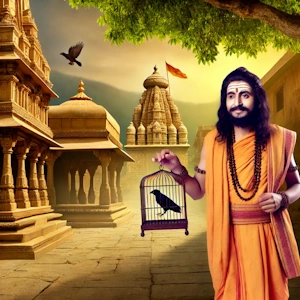Comments
Read more comments
Strategy If Surrounded by Many Rivals - Part 1
Once, Yudhishthira asked Bhishmacharya:
शत्रुभिर्बहुभिर्ग्रस्तो यथा वर्तेत पार्थिवः
एतदिच्छाम्यहं श्रोतुं सर्वमेव यथाविधि
'When a king is surrounded by many enemies, what should he do? Please tell me in detail.
We are not talking about a fight between two kings. When someone is surrounded by multiple enemies, each with his own independent agenda, what should he do then?
This is raja dharma, kshatriya dharma. But in today’s world, everybody is a king in his own small kingdom. We don’t have kings anymore who would do anything to protect us. So this applies to everyone, and it is common sense.
सर्वत्र प्रार्थ्यमानेन दुर्बलेन महाबलैः
एकेनैवासहायेन शक्यं स्थातुं कथं भवेत्
This is important. Everyone has faced this, or is facing this, or will face this at some point in time.
When trouble comes, it comes together. And the man in the middle feels lonely. He feels weak. He feels lost. He feels helpless.
What should he do?
The enemies all around are strong, very strong. When they see someone in trouble, all of them pounce. They have just been waiting for an opportunity. Everybody who has a score to settle would come in now.
What should he do now?
Bhishma said:
'There is nothing in this world called permanent friendship or permanent enmity. Depending on the circumstances, a friend can become an enemy, and an enemy can become a friend.
We see this every day but still don’t want to accept it.
सामर्थ्ययोगात् कार्याणां अनित्या वै सदा गतिः
Friendship and enmity are circumstantial; they are impermanent. Be very clear here.
We are talking only about functional relationships here. We are not talking about genuine, lifelong friendships. These are friendships created to get work done, cordial relationships maintained to achieve goals.
Never give up on a genuine friend. Never give up on a sincere friend. Never give up on someone who looks up to you. A friend in need is only a friend indeed.
Here we are talking only about functional friendships—friendships that get work done, friendships of convenience.
Everything depends on the circumstances in terms of place and time. What to do will also depend on the circumstances.
It is important to maintain relationships with your friends. It is also important to compromise with rivals depending on the situation.
Ultimately, survival is most important. Everything else is secondary. If survival is at stake, if you are not going to survive, what value will your name, fame, and position hold?
This is not only about life. People risk their careers. 'How can they do this to me?' 'It is a matter of my prestige!' 'How can they sideline me like this?' 'I can’t take it. I am going to put in my papers.'
But think clearly—if you are going to walk away, what value will your prestige have in that organisation anymore? Only if you exist within that organisation does your prestige have any relevance. Otherwise, not.
So survival is the most important thing. Everything else will come only later.
A man who refuses to compromise with his rivals or enemies when the situation calls for it will perish. His life will be a failure—even if this means a change in the status of his friendship with someone else.
Bhishma says it all depends on the circumstances. Survival is most important. When friendship and enmity themselves are impermanent, how can you hold on to them and make choices about them or based on them?
We are not talking about day-to-day situations. We are talking about crisis situations.
There was a banyan tree in a forest. A cat used to live on one of its branches, and the birds on the tree used to be its food.
There was a mouse who had dug for himself a big mouse hole under the tree and used to live there. The cat is always the mouse’s enemy, but it hardly ever came down, and the mouse also stayed out of its sight.
There was a hunter in that forest. Every sunset, he used to come to the tree, spread his net, go away, and return the next morning. He used to get something or the other.
One day, the cat got trapped in the net. The mouse became very happy. His lifelong fear was gone. His lifelong enemy would disappear the next morning.
He came out of his hole and started walking merrily around the trapped cat. Now there was nothing to fear in life.
After some time, the mouse started feeling hungry. He saw the food by the side of the net, kept as bait. By this time, the net had already folded itself with the cat inside, like a bag. The rolled-up net was above the ground, hanging from the tree on a rope.
The mouse went near, leaped up, and started eating, smiling to himself at the fate of his arch-rival. He was so near, and still, the cat couldn’t touch him.
Knowledge Bank
Apurva: The Invisible Link Between Rituals and Results
Apurva, in the Purva Mimamsa school of philosophy, refers to an unseen force generated by action, especially ritual actions. This force exists from the moment an action begins until its result is achieved, acting as the invisible link between the two. The concept of apurva explains how actions, particularly karmic or ritualistic ones, yield their intended outcomes, even when the results manifest much later. It underscores the continuity between effort and consequence, providing a philosophical basis for the workings of karma and ritual efficacy.
What is Saraswati Devi's veena's name?
Saraswati Devi's veena is called Kacchapi (कच्छपी).
Recommended for you
Whistle-blower Protection Policy in Ancient Bharat

Religious Impurity

Narmada Kavacham

yam' yam' vaanchhayati kaamam' yah' pat'het kavacham' shubham . tam' tam' praapnoti vai sarvam' narmadaayaah' prasaadatah' ......
Click here to know more..